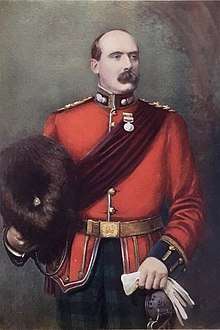Alexander Thorneycroft
Major-General Alexander Whitelaw Thorneycroft, CB (19 January 1859 – 4 November 1931) was a senior British Army officer during the Second Boer War.
Alexander Whitelaw Thorneycroft | |
|---|---|
 Lt. Col. Alexander Thorneycroft c.1900 | |
| Born | 19 January 1859 Wolverhampton |
| Died | 4 November 1931 (aged 72) Reading, Berkshire |
| Buried | Earley St. Peter Churchyard, Earley, Berkshire |
| Allegiance | United Kingdom |
| Service/ | British Army |
| Years of service | 1879– |
| Rank | Major-General |
| Unit | Royal Scots Fusiliers |
| Commands held | Thorneycroft Mounted Infantry 14th Infantry Brigade South Midland Division |
| Battles/wars | Second Boer War |
| Awards | Companion of the Order of the Bath |
Biography
Thorneycroft was the son of Lieutenant-Colonel Thomas Thorneycroft, JP, a former High Sheriff of Staffordshire, by his wife Jane Whitelaw.[1]
He was commissioned a second lieutenant in the Royal Scots Fusiliers on 22 February 1879, and served in the Anglo-Zulu War later the same year, followed by the operations against Sekukuni. Two years later, he served in the First Boer War of 1881, and took part in the defence of Pretoria, following which he was promoted to lieutenant on 1 July 1881. He was promoted to captain on 23 January 1887, to major on 1 July 1899, and received the brevet rank of lieutenant-colonel on the same day.[2]
Expecting military hostilities, Thorneycroft was one of several officers sent to South Africa to raise volunteer units shortly before the Second Boer War broke out in October 1899. He raised a corps of troopers, later known as the Thorneycroft′s Mounted Infantry, which served in the early stages of the war, including in the campaign to relieve Ladysmith, which was under siege by troops from the Boer republics. In the Battle of Spion Kop in late January 1900, he was selected to lead the initial assault. Before dawn, the British forces had captured what they thought was the summit of the kop, or hill. The Boers, who actually held the higher ground, soon counter-attacked, swarming the British position, and the higher ranking British officers were killed or mortally wounded, leaving Thorneycroft the most senior officer present. A British counterattack failed in the face of withering fire from the Boers, but Thorneycroft refused to allow any under his command to surrender. Not knowing that they actually had gained the upper hand over the course of the day, and running short on both water and ammunition, the British troops retreated under cover of dark. The battle at Spion Kop was considered a resounding defeat, but the British regrouped and was able to relieve Ladysmith four weeks later. Thorneycroft received a brevet promotion to lieutenant-colonel, and was appointed a Companion of the Order of the Bath (CB) in the April 1901 South Africa Honours list (the award was dated 29 November 1900).[3] He stayed in South Africa throughout the war, which entered a phase of guerrilla warfare from late 1900. In his final despatch from South Africa in June 1902, Lord Kitchener, Commander-in-Chief of the forces during the latter part of the war, described Thorneycroft as "an absolutely reliable officer of great experience, common-sense and force of character."[4] For his service in the later part of the war, Thorneycroft received a brevet promotion to colonel on 22 August 1902.[5]
After the end of the war in June 1902, Thorneycroft was among a number of officers who left Cape Town in the SS Kildonan Castle in late July, arriving in Southampton the following month.[6] Following his return, he was appointed assistant adjutant-general of the 7th Infantry Division, serving in Dublin, in November 1902.[7] He then became Commander of 14th Infantry Brigade in November 1905 and General Officer Commanding South Midland Division in September 1911 before retiring in July 1912.[8]
References
- "Alexander Thorneycroft". Find-a-grave. Retrieved 9 June 2020.
- Hart´s Army list, 1901
- "No. 27306". The London Gazette. 19 April 1901. p. 2697.
- "No. 27459". The London Gazette. 29 July 1902. pp. 4835–4837.
- "No. 27490". The London Gazette. 31 October 1902. p. 6897.
- "Naval & Military intelligence". The Times (36834). London. 31 July 1902. p. 5.
- "Naval & Military intelligence". The Times (36901). London. 17 October 1902. p. 8.
- "Army Commands" (PDF). Retrieved 9 June 2020.
| Military offices | ||
|---|---|---|
| Preceded by Herbert Raitt |
GOC South Midland Division 1911–1912 |
Succeeded by John Keir |